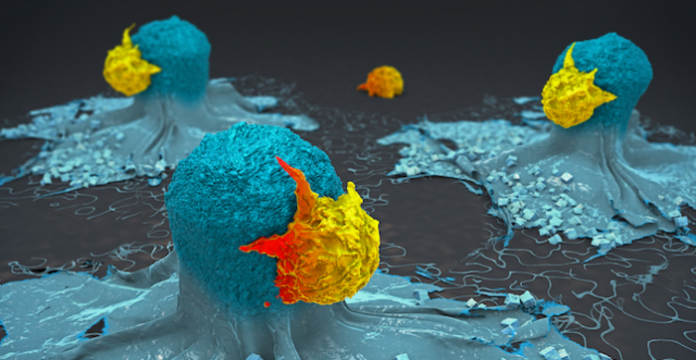
Research led by Tel Aviv University and the University of Lisbon has identified a small molecule inhibitor which may be a more accessible and effective alternative to anti-PD-1/PD-L1 immunotherapy antibodies already being used to treat a range of cancers.
Inhibiting programmed cell death protein 1 (PD1) and the PD-ligand 1 (PD-L1) are both successful antibody targets used to treat several types of cancer such as Non-Hodgkin Lymphoma by allowing the immune system to fight cancer cells instead of using chemotherapy.
However, so far only monoclonal antibodies have been approved as PD-1/PD-L1 inhibitors, making this form of cancer therapy less accessible to a wide range of patients due to a short shelf life and high production costs.
The new study has now identified a small molecule aiming to achieve PD1/PD-L1 inhibition in a less expensive and more efficient way. The findings published in the Journal for Immunotherapy of Cancer, show that the small molecule inhibitor improves the activation of immune cells inside the tumor leading to an effective reduction of tumor growth in humanized animal models created by the insertion of chimeric PD-1 molecules into mice.
“… we confirmed that the small molecule controls tumor growth as effectively as the antibodies – it inhibits PD-L1 in animals engineered to have human T cells. In other words, we have developed a molecule that can inhibit PD-1/PD-L1 binding and remind the immune system that it needs to attack the cancer, “ said Ronit Satchi-Fainaro, professor of pharmacology at Tel-Aviv University and co-author of the study in a press statement.
„ Moreover, the new molecule has some major advantages over the antibody treatment. First of all, the cost: since the antibody is a biological rather than a synthetic molecule, it requires a complex infrastructure and considerable funds to produce, costing about $200,000 per year per patient.”
„In contrast, we have already synthesized the small molecule with simple equipment, in a short time and at a fraction of the cost. Another advantage of the small molecule is that patients will probably be able to take it at home, orally, without the need for IV administration in the hospital.”
Satchi-Fainaro also adds that in addition to accessibility factors the small molecule is not entirely dependent on the tumor´s blood vessels making it easier for the inhibitor to reach the tumor environment even in particular areas not well connected to blood supply. Antibodies in contrast are not able to access the tumor without any blood vessels present.
The researchers say that in comparison to antibodies, small molecule inhibitors usually need to be administered at higher concentrations or more regularly. However, due to the high efficacy in terms of T-cell activation and tumor growth the small molecule discovered by the scientists may be administered at the same dose as conventional antibodies used in immunotherapy.
Previous research, published in Frontiers in Immunology has also identified a small molecule targeting PD-1 with promising results. In animal models the small molecule inhibitor showed enhanced cytotoxicity towards lung cancer and melanoma cells. However, both studies are yet to be translated into clinical trials.













